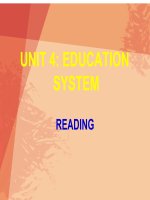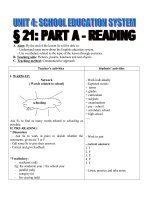- Trang chủ >>
- Lớp 9 >>
- Giáo dục công dân
50 cau hoi Kiem tra Unit 4 School Education System
Bạn đang xem bản rút gọn của tài liệu. Xem và tải ngay bản đầy đủ của tài liệu tại đây (124.54 KB, 9 trang )
Choose the word whose main stress syllable is put differently.
1. A. remain
B. seaman {sailor}
C. contain D
. retain
2. A. control
B. patrol
C. idol
D. extol
Choose the word whose underlined part is pronounced differently from that of the rest.
3. A. parallel
B. label
C. vessel
D. chapel
4. A. typist
B. typical
C. typing
D. stylish
5. A. vein
B. reign
C. foreign
D. main
Choose the word or phrase (A, B, C or D) that best completes each sentence.
6. With black hair and eyes, she is_________of the people from her country.
A. the same
B. typical
C. similar
D. identical
7. Military is_________in this country. Every man who reaches the age of 18 has to serve in
the army for two years.
A. compulsory
B. optional
C. illegal
D. unnecessary
8. People tend to work hard at this_________of life.
A. distance
B. stage
C. space
D. level
9. Concern for the environment is now at the_________of many governments' policies.
A. core
B. aim
C. target
D. purpose
10. Why don't you have the document_________?
A. photocopy
B. to photocopy
C. photocopying
D. photocopied
11. The strange disease_________to have originated in Africa.
A. thinks
B. is thinking
C. is thought
D. thought
C. isn't worked
D. doesn't work
12. You can use my phone if yours _________.
A. won't be worked
B. won't work
13. We were rather late, but fortunately there were some tickets_________.
A. to leave
B. left
C. leaving
D. having left
C. have it enlarged
D. set it enlarged
14. It's a beautiful photo. I'm going to_________.
A. get it enlarging
B. have it enlarging
15. _________these plants regularly or they will die.
A. Water
B. If you water
C. Unless you water
D. Because you water
16. I took off my shoes before entering the room _________.
A. in order to not dirty the floor
B. so that I not dirty the floor
C. in order not dirtying the floor
D. so as not to dirty the floor
17. What _________if you saw a pickpocket steal money from someone in the street?
A. do you do
B. did you do
C. will you do
D. would you do
18. The living conditions of the population _________in the past years.
A. has been improved
B. have been improved
C. improved
D. were improved
19. His father used the money he won to set_________his own company.
A. on
B. about
C. up
D. forward
20. Although I was very tired, _________.
A. but I helped to clear up the mess after the party
B. I helped to clear up the mess after the party
C. and I tried to clear up the mess after the party
D. I didn't help to clear up the mess after the party
21. We hope to have the law _________by December.
A. pass
B. to pass
C. passing
D. passed
22. "How does the washing machine work?"" _________"
A. Not often
B. Like this
C. Too much
D. A little
C. am
D. have
23. I_________like that dress. It's really nice.
A. do
B. very
24. We couldn't find _________could take over his job.
A. anyone
B. whom
C. someone
D. anyone who
25. Everything_________turned out to be imaginary.
A. she said it
B. she said
C. which she said it
D. that said
26. I keep sneezing because I got wet_________the way home yesterday.
A. in
B. from
C. on
D. during
27. Don't you know what happened_________the people who went on holiday with us?
A. to
B. with
C. for
D. at
28. Spain_________once a very powerful country.
A. was
B. is
C. used to
D. has been
29. I _________tired. Let's find somewhere to have a rest.
A. got
B. am getting
C. get
D. was getting
30. By the end of this week, I_________here for ten days.
A. stay
B. am staying
C. will stay
D. will have stayed
31. I found this wallet on the street while I _________to school.
A. walk
B. am walking
C. have walked
D. was walking
32. The washing-machine has broken down again. I think we should get_________.
A. a new
B. a new one
C. other new
D. new one
33. - I don't feel like_________home. - What about_________out for a walk?
A. to stay/to go
B. to stay/going
C. staying/to go
D. staying/going
34. _________we were lost, he offered to show us the way home.
A. Thought
B. Thinking
C. To think
D. Think
35. He _________missed the train. He was just in time to catch it.
A. near
B. nearly
C. nearest
D. mostly
Choose the underlined part in each sentence that should be corrected.
36. The oil price is believing to be rising again.
A
B
C
D
37. While the Brows were away on holiday, their house was broke into.
A
B
C
D
38. Why don’t you congratulate our son about passing his final exam?
A
B
C
D
39. Now that I’ve become old, I can’t read as quick as I used to.
A
B
C
D
40. There have been a report of several bombings by terrorist groups.
A
B
C
D
Choose the item (A, B, C or D) that best completes each of the following sentences.
In 1988, for the first time in British history, a National Curriculum was introduced. The
National Curriculum tells pupils which subjects they have to study, what they must learn and
when they have to take assessment tests. [assessment: đánh giá]
Between the ages of 14 and 16, pupils study for their GCSE (General Certificate of
Secondary Education) exams. Pupils must take English Language, Maths and Science for
GCSE, as well as a half GCSE in a foreign language and Technology. addition, they must
also be taught Physical Education, Religious Education and Sex Education, although they do
not take exams in these subjects.
At the age of 16, pupils can leave school. If pupils stay on, they usually take A (Advanced)
levels, AS (Advanced Supplementary) level or GNVQs (Greater National Vocational
Qualifications). It is quite common to combine, for example, two A levels with one AS level,
or one A level with one GNVQ.
Pupils taking A levels study traditional subjects, such as French, Physics or History. To go to
university, pupils usually need two or three A levels.
AS levels are the same standard as A levels, but only half of the content: AS level German.
Pupils take the A-level German language exam, but do not take the A-level German
Literature exam.
GNVQs are vocational qualifications. Pupils usually take on GNVQ in subjects such as
Business, Leisure and Tourism, Manufacturing, and Art and Design. One GVNQ (at
advanced level) is equal to two A levels.
41. Britain began to have a National Curriculum _________.
A. one hundred years ago
B. in the nineteenth century
C. in 1898
D. in 1988
42. Which of the following subjects do British students NOT take exams in?
A. Science
B. Physical Education
C. Maths
D. English Language
43. Pupils need_________A levels to continue to study at university.
A. one or two
B. two or three
C. four or five
D. five or six
44. Which of the following subjects do pupils NOT take on GNVQ in?
A. German Literature
B. Business
C. Art and Design
D. Manufacturing
45. Pupils normally study for their GCSE between the ages of _________.
A. 12 and 14
B. 14 and 16
C. 15 and 17
D. 16 and 18
Choose the word or phrase that best fits each space in the following passage.
A tiny village school is soon to celebrate its 110 birthday - against all expectations. Five
years ago it seemed certain to close but parents and other villagers fought the local education
authority and raised funds to keep it (46)_________. It is now ending its first term as a school
(47)_________by the village community and the villagers are just proud of their
achievement.
They were furious when education chiefs tried to make them send the village children to
other schools further away because the number of pupils at the village school was too
(48)_________. The villagers started a huge campaign (49)_________money. They collected
enough to hire a teacher and begin to help with school cleaning, lunch supervision and
lessons. Now the school is doing well and it seems (50)________it will continue to run in the
future.
46. A. open
B. opened
C. to opening
D. for opening
47. A. run
B. running
C. has run
D. to run
48. A. little
B. less
C. few
D. small
49. A. rise
B. raise
C. pay
D. deal
50. A. in case
B. even though
C. as if
D. if only
LỜI GIẢI CHI TIẾT
Câu 1: Đáp án B
remain /ri'mein/(n) đồ thừa, cái còn lại
seaman /'si:mən/(n) thuỷ thủ
contain /kən'tein/(v) chứa đựng, bao hàm, gồm có, bao gồm
retain /ri'tein/(v) giữ, cầm lại
Đáp án B, trọng âm nhấn vào âm tiết thứ 1, còn lại vào âm tiết thứ 2
Câu 2: Đáp án C
control /kən'troul/(n) quyền hành, quyền lực, quyền chỉ huy
patrol /pə'troul/(n) đội tuần tra; việc tuần tra
idol /'aidl/(n) tượng thần, thần tượng
extol /iks'tɔl/(v) tán dương, ca tụng
Câu 3: Đáp án A
parallel /'pærəlel/(adj) song song
label /'leibl/(n) nhãn, nhãn hiệu
vessel /'vesl/(n) bình, chậu, lọ, thùng,
chapel /ˈtʃỉpl/ n) nhà thờ nhỏ (ở nhà tù, ở trại lính...);
Đáp án A, đọc là e, còn lại đọc là pl/bl
Câu 4: Đáp án B
typist /'taipist/(n) người đánh máy
typical /'tipikl/(adj) tiêu biểu, điển hình
typing /'taipiɳ/(n) sự đánh máy
stylish /'stailiʃ/(adj) bảnh bao, diện; hợp thời trang
Đáp án B, đọc là i, còn lại đọc là ai
Câu 5: Đáp án C
vein /vein/(n) (giải phẫu) tĩnh mạch
reign /rein/(n) triều đại, triều
foreign /'fɔrin/(adj) (thuộc) nước ngoài, từ nước ngồi, ở nước ngồi
main /mein/(n) phần chính, phần cốt yếu, phần chủ yếu
Đáp án C, đọc là i, còn lại đọc là ei
Câu 6: Đáp án B
Giải thích: Be typical of : là điển hình, đặc trưng
Identical(adj) đúng, đồng nhất
Similar (adj) tương tự
Dịch nghĩa: Với mái tóc và đơi mắt đen, cơ ấy là điển hình cho những người dân từ quốc gia
mình
Câu 7: Đáp án A
Compulsory(adj) bắt buộc
Optional(adj) tùy chọn
Illegal (adj) bất hợp pháp,
Dịch nghĩa: Nghĩa vụ quân sự là bắt buộc ở đất nước này. Mọi đàn ông 18 tuổi phải phục vụ
quân đội trong 2 năm
Câu 8: Truy cập –để xem chi tiết
nhà
Câu 17: Đáp án D
Giải thích:Câu điều kiện loại II có dạng : If +S+ V(quá khứ giả định), S + would +V
Dịch nghĩa: Bạn sẽ làm gì nếu bạn thấy một tên móc túi lấy trộm tiền của ai đó trên đường?
Câu 18: Đáp án B
Giải thích: ‘in the past years’ là dấu hiệu thì hiện tại hoàn thành, chủ ngữ số nhiều, tobe chia
là ‘have been’
Dịch nghĩa: Chất lượng cuộc sống của người dân đã cải thiện trong những năm gần đây
Câu 19: Đáp án C
Giải thích: Set up: thành lập, dựng nên
Set about : chuẩn bị làm gì
Set forward: đề bạt, xúc tiến
Dịch nghĩa: Cha của anh ấy đã dùng số tiền thắng cuộc của anh ấy để thành lập công ti cho
riêng mình
Câu 20: Đáp án B
Giải thích: Trong mệnh đề nhượng bộ, có ‘although’ thì khơng có ‘but’ câu C,D sai về nghĩa.
Dịch nghĩa: Dù tôi rất mệt, tôi đã giúp dọn dẹp đống bừa bộn sau bữa tiệc
Câu 21: Đáp án D
Giải thích: To pass (a) law : thơng qua luật,
Have/get st done: bị động truyền khiến,
Dịch nghĩa: Chúng tôi hi vọng bộ luật sẽ được thông qua cho đến tháng 12
Câu 22: Đáp án B
Giải thích: Like this : như thế này
Too much: quá nhiều >< A little : một chút
Not often : không thường xuyên
Dịch nghĩa: “ Cái máy giặt này hoạt động như nào vậy” - “như thế này”
Câu 23: Đáp án A
Giải thích:
Trong câu khẳng định, dùng ‘do/does’ + V để nhấn mạnh ý nghĩa câu nói
Dịch nghĩa: Tơi rất thích chiếc váy đó. Nó thật đẹp
Câu 24: Đáp án D
Giải thích:
‘who’ là đại tự quan hệ thay thế cho danh từ ‘anyone’, mở đầu mệnh đề bổ nghĩa cho
‘anyone’
Dịch nghĩa: Chúng ta khơng thể tìm được bất cứ ai mà đảm nhiệm được công việc nay
Câu 25: Đáp án B
Giải thích:
She said = that she said
Dịch nghĩa: Mọi thứ cơ ta nói hóa ra đều là tưởng tượng.
Câu 26: Đáp án C
Giải thích:
Cụm từ : on the way : trên đường
Dịch nghĩa: Tôi bị hắt hơi suốt vì tơi đã bị ướt trên đường về nhà ngày hơm qua.
Câu 27: Đáp án A
Giải thích:
Happened to : xảy ra với
Dịch nghĩa: Bạn có biết điều gì đã xảy ra với những người đi nghỉ mát cùng chúng ta khơng?
Câu 28: Đáp án A
Giải thích: Dấu hiệu ‘once’ (từng là) của thì quá khứ đơn
Dịch nghĩa: Tây Ban Nha từng là một đất nước hùng mạnh
Câu 29: Đáp án B
Giải thích:
Be getting/becoming + adj: trở nên, bắt đầu (chỉ trạng thái)
Dịch nghĩa: Tôi bắt đầu thấy mệt. Hãy đến nơi nào đó nghỉ ngơi
Câu 30: Đáp án D
Giải thích:Dấu hiệu ‘by the end of this week’ chỉ thời điểm cụ thể trong tương lai, là dấu hiệu
thì tương lai hồn thành,
Dịch nghĩa: Đến cuối tuần này, tôi sẽ ở đây được 10 năm
Câu 31: Truy cập –để xem chi tiết
Câu 45: Đáp án B
Giải thích: Between the ages of 14 and 16, pupils study for their GCSE
Dịch nghĩa: Trong độ tuổi từ 14 và 16, học sinh cần học cho kì thi GCSE của họ
Câu 46: Đáp án A
Giải thích: keep st + adj : duy trì, giữ cho (một trạng thái của sự vật)
-> giữ cho ngôi trường mở
Câu 47: Đáp án A
Giải thích:
Run by: được điều hành bởi
Run by =which was run by
Câu 48: Đáp án C
Giải thích:few : ít, một vài (đi với danh từ đếm được số nhiều -)
Câu 49: Đáp án B
Giải thích:
To raise money : gây quỹ
Câu 50: Đáp án C









